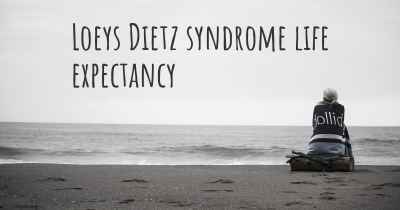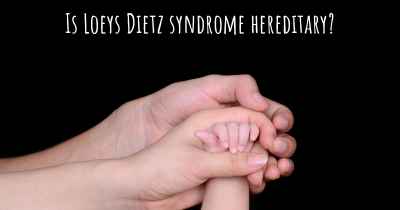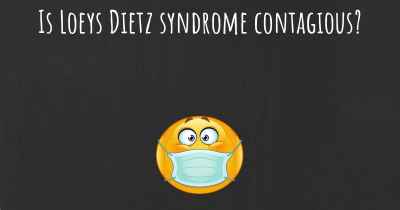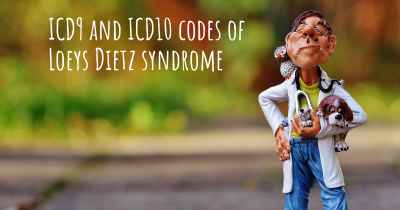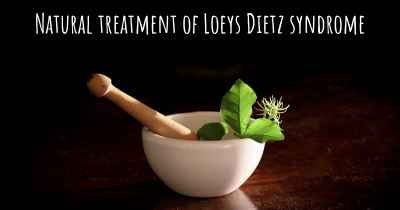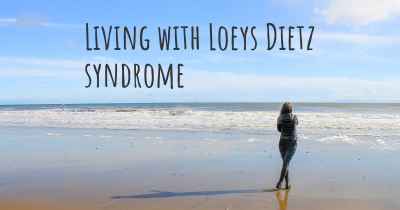2
What are the best treatments for Loeys Dietz syndrome?
See the best treatments for Loeys Dietz syndrome here
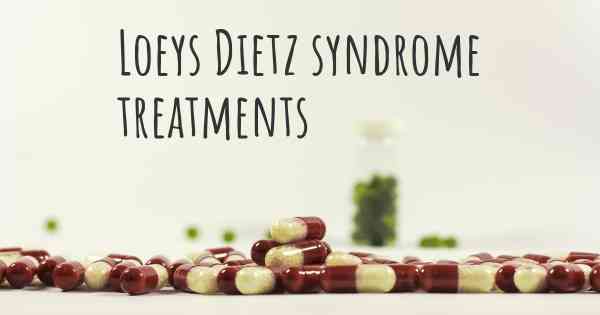
The most effective treatment is having your doctor put you on cardiac medicine and one of them especially... Losartan. Losartan is the choice of medicine to use per Dr. Dietz at John Hopkins.
Posted Feb 6, 2018 by Helene 1600
Pain management for arthritis. CTA or MRA of the arterial tree are a must to check for aneurisms. Surgery to repair aneurisms.
Posted May 12, 2019 by Sherri 800
Copied from loeysdietz.org
LDS manifests itself in a number of ways; therefore, no two persons with LDS will have identical medical characteristics. It is recommended that you consult your physician or a local geneticist if you have questions about individual health concerns.
Medications: Pressure on the aorta (the largest artery leaving the heart) and other arteries can be controlled by the administration of medications that work to lessen the strain on the body’s major arteries by reducing heart rate and blood pressure. In mouse models of LDS the specific class of blood-pressure lowering medications known as angiotensin receptor blockers, has shown great benefit in reducing aneurysm growth. In people impacted by LDS, if this type of medication is used, it should be used at optimal titration. Angiotensin receptor blockers include medications by the name of Losartan, Irbesartan or Candesartan. Many people are also maintained on beta-blockers (Atenolol, Metoprolol). It is recommended that individuals with LDS remain on these medications even after surgical repair of aneurysms.
Imaging: Continued monitoring of the aorta through annual echocardiograms is necessary. A baseline CTA or MRA of the head, neck, chest, abdomen and pelvis should also be performed to detect and monitor aneurysm formation and/or dissections (tears). The frequency of these scans depends on aneurysm size and rate of growth, so it is recommended that individuals consult their doctor on the appropriate intervals for imaging. Individuals should try not to go more than two years without head-to-pelvis imaging. If a person is using MRA imaging for surveillance, every few imaging cycles a CTA of the head and neck should be considered, as this imaging has better clarity of small arteries in the head and neck.
Cervical Spine Imaging: X-rays of the cervical spine in the flexion and extension positions are recommended to assess for vertebral anomalies and/or instability. If there are any anomalies detected, consultation with an orthopedist is recommended. Rarely, surgery for cervical spine fusion is required. It is important to assess for cervical spine instability prior to undergoing any surgery, as this may impact intubation procedures.
Vascular Surgery: Vascular surgery is a widely recommended treatment option as a preventative surgery for individuals with a rapidly enlarging aorta or artery or a pronounced family history of arterial dissection. Aortic root replacement is the most common vascular surgery occurring in individuals with LDS, and it is highly successful. There are many examples of successful arterial repairs for aneurysms throughout the body through a variety of surgical interventions as vascular tissue is not typically weak or fragile in individuals with LDS.
Exercise Restrictions: Exercise restrictions are typically put in place to assist in slowing the rate of aortic and arterial aneurysm growth. It is advised that individuals with LDS avoid competitive sports, especially contact sports, and other exercises or muscle straining activities performed to the point of exhaustion. Individuals can and should remain active with aerobic types of activities that are performed in moderation. Exercises where you have to strain your muscles, such as push-ups, chin-ups, sit-ups, are to be avoided. Activities such as hiking, biking, jogging and swimming that help to naturally lower the heart rate and blood pressure should be a part of an individual's cardiovascular activity. A good recommendation for cardiovascular activities is to exercise only to a level where you can hold a conversation while performing the activity.
Orthopedics: Individuals with LDS may need orthopedic surgery or other interventions such as bracing for scoliosis, orthotics/surgeries for foot deformities or contractures or harnesses for congenital hip dislocation. Typically, surgery for pectus anomalies is pursued for cosmetic purposes and not out of medical necessity.
Allergies: Environmental and food allergies are increased in individuals with LDS and may require a consultation with an allergist or gastroenterologist. Allergic reactions may present as rhinitis or sinusitis, eczema, or hives. Gastrointestinal complaints can include the feeling of food getting stuck in your throat, diarrhea, abdominal pain or difficulty gaining weight. Some individuals have severe inflammatory disease of the esophagus or intestines that may need stricter intervention such as medications or feeding tubes to help with caloric intake.
It is always important to consult your doctor to determine an effective and personalized course of action.
LDS manifests itself in a number of ways; therefore, no two persons with LDS will have identical medical characteristics. It is recommended that you consult your physician or a local geneticist if you have questions about individual health concerns.
Medications: Pressure on the aorta (the largest artery leaving the heart) and other arteries can be controlled by the administration of medications that work to lessen the strain on the body’s major arteries by reducing heart rate and blood pressure. In mouse models of LDS the specific class of blood-pressure lowering medications known as angiotensin receptor blockers, has shown great benefit in reducing aneurysm growth. In people impacted by LDS, if this type of medication is used, it should be used at optimal titration. Angiotensin receptor blockers include medications by the name of Losartan, Irbesartan or Candesartan. Many people are also maintained on beta-blockers (Atenolol, Metoprolol). It is recommended that individuals with LDS remain on these medications even after surgical repair of aneurysms.
Imaging: Continued monitoring of the aorta through annual echocardiograms is necessary. A baseline CTA or MRA of the head, neck, chest, abdomen and pelvis should also be performed to detect and monitor aneurysm formation and/or dissections (tears). The frequency of these scans depends on aneurysm size and rate of growth, so it is recommended that individuals consult their doctor on the appropriate intervals for imaging. Individuals should try not to go more than two years without head-to-pelvis imaging. If a person is using MRA imaging for surveillance, every few imaging cycles a CTA of the head and neck should be considered, as this imaging has better clarity of small arteries in the head and neck.
Cervical Spine Imaging: X-rays of the cervical spine in the flexion and extension positions are recommended to assess for vertebral anomalies and/or instability. If there are any anomalies detected, consultation with an orthopedist is recommended. Rarely, surgery for cervical spine fusion is required. It is important to assess for cervical spine instability prior to undergoing any surgery, as this may impact intubation procedures.
Vascular Surgery: Vascular surgery is a widely recommended treatment option as a preventative surgery for individuals with a rapidly enlarging aorta or artery or a pronounced family history of arterial dissection. Aortic root replacement is the most common vascular surgery occurring in individuals with LDS, and it is highly successful. There are many examples of successful arterial repairs for aneurysms throughout the body through a variety of surgical interventions as vascular tissue is not typically weak or fragile in individuals with LDS.
Exercise Restrictions: Exercise restrictions are typically put in place to assist in slowing the rate of aortic and arterial aneurysm growth. It is advised that individuals with LDS avoid competitive sports, especially contact sports, and other exercises or muscle straining activities performed to the point of exhaustion. Individuals can and should remain active with aerobic types of activities that are performed in moderation. Exercises where you have to strain your muscles, such as push-ups, chin-ups, sit-ups, are to be avoided. Activities such as hiking, biking, jogging and swimming that help to naturally lower the heart rate and blood pressure should be a part of an individual's cardiovascular activity. A good recommendation for cardiovascular activities is to exercise only to a level where you can hold a conversation while performing the activity.
Orthopedics: Individuals with LDS may need orthopedic surgery or other interventions such as bracing for scoliosis, orthotics/surgeries for foot deformities or contractures or harnesses for congenital hip dislocation. Typically, surgery for pectus anomalies is pursued for cosmetic purposes and not out of medical necessity.
Allergies: Environmental and food allergies are increased in individuals with LDS and may require a consultation with an allergist or gastroenterologist. Allergic reactions may present as rhinitis or sinusitis, eczema, or hives. Gastrointestinal complaints can include the feeling of food getting stuck in your throat, diarrhea, abdominal pain or difficulty gaining weight. Some individuals have severe inflammatory disease of the esophagus or intestines that may need stricter intervention such as medications or feeding tubes to help with caloric intake.
It is always important to consult your doctor to determine an effective and personalized course of action.
Posted May 12, 2019 by Derek 4050
Medication, such as Losartan. Strengthening of muscles. Aneurysm repair. Heart valve repair. Asthma treatment, Knee and joint replacement. Scoliosis, back strengthening. Slowing down life. No contact sports etc.
Posted May 14, 2019 by Glenn 2500
Close observation
MRI of brain
CT of trunk
Surgical repairs when indicated to prevent emergent surgery
MRI of brain
CT of trunk
Surgical repairs when indicated to prevent emergent surgery
Posted May 15, 2019 by Vicki 1800
